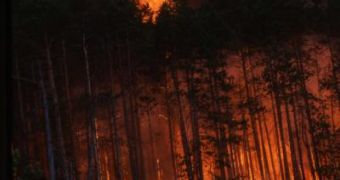A new comprehensive survey of the effects that fires around the globe have on the environment has revealed that the amount of carbon dioxide placed in the atmosphere naturally is about 50 percent that emitted by humans through burning fossil fuels. These finds suggest that the influence of events such as wildfires has been grossly underestimated, and that their effects on weather patterns may actually be a lot stronger than first thought.
“We've estimated that deforestation due to burning by humans is contributing about one-fifth of the human-caused greenhouse effect – and that percentage could become larger. It's very clear that fire is a primary catalyst of global climate change. The paper is a call to arms to earth scientists to investigate and better evaluate the role of fire in the Earth system,” University of Arizona in Tucson (UAT) Laboratory of Tree-Ring Research Director Thomas W. Swetnam cautioned. He is also the co-author of a new scientific paper detailing the finds, called Fire in the Earth System, to be published today, in the April 24th issue of the journal Science.
“Fires are obviously one of the major responses to climate change, but fires are not only a response – they feed back to warming, which feeds more fires. The scary bit is that, because of the feedbacks and other uncertainties, we could be way underestimating the role of fire in driving future climate change,” Swetnam added.
“We're most concerned that fire has not been rigorously and adequately incorporated in the climate models. It's remarkable that such an integral part of the landscape has been so sidelined,” the lead co-author of the Science paper, David Bowman, shared.
“We don't think about fires correctly. Fire is as elemental as air or water. We live on a fire planet. We are a fire species. Yet, the study of fire has been very fragmented. We know lots about the carbon cycle, the nitrogen cycle, but we know very little about the fire cycle, or how fire cycles through the biosphere,” Jennifer K. Balch, who is the other lead co-author of the study, explained.
She is an expert at the National Center for Ecological Analysis and Synthesis, in Santa Barbara, California. Speaking of the research, she stressed that, “This synthesis is a prerequisite for adaptation to the apparent recent intensification of fire feedbacks, which have been exacerbated by climate change, rapid land-cover transformation, and exotic species introductions.”

 14 DAY TRIAL //
14 DAY TRIAL //